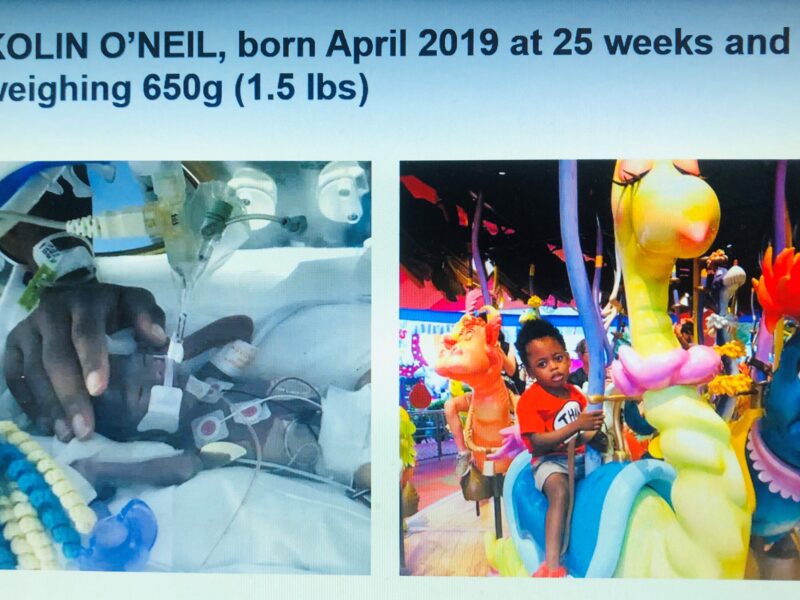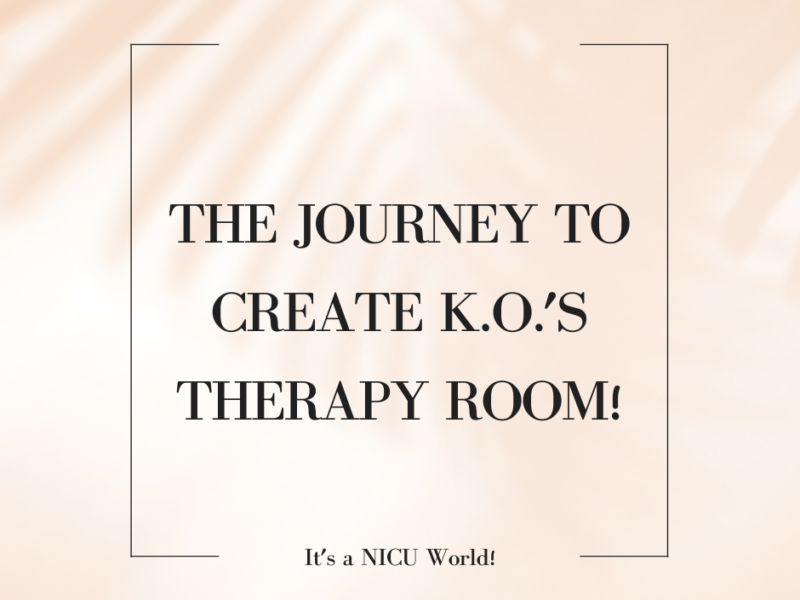As an occupational therapist working in the NICU and PICU, what does your typical day look like?
Every day is a little different. There may be new infants and children to assess and some days only the ones already on caseload. Numbers fluctuate too, typically from 10 on caseload to 25. Each morning I spend some time reviewing charts which helps me decide what my priorities are for the day. Most days, I do a lot of running back and forth between the units trying to see as many kids as possible. Being part of the rehab department, I am held to productivity standards which unfortunately can also influence my day. Some days though, I’ve been known to say forget about productivity, I am needed here to help with whatever is going on. I may be part of the rehab department, but the NICU and PICU are my home.
How do you mentally prepare yourself for each shift?
One thing I learned early on is to leave my baggage at the door. If I am having a bad day or have a lot on my mind, it can negatively influence my therapy sessions. The NICU babies and children can feel your energy and it is not fair to project any negativity or stress onto them. I take a lot of cleansing breaths throughout the day to help stay focused and push aside my personal life. I want to be able to give the best of me to my patients.
What are the criteria for an OT consult to be ordered?
In our NICU, we are automatically consulted on every baby at admission. We are lucky that the neonatology team believes in the benefits of therapy and developmental care and what we can offer from day one.
What do you enjoy most about your job?
Where do I begin? I am lucky that every day I get to go to work, hold babies and play. I love seeing each child’s personality and strength shine through as I help them to hopefully reach, or at least start them on their journey to their full potential. I love the relationships that have formed with both the children/infants and the families. I have many relationships that began in the NICU/PICU but have only grown stronger outside the walls of the hospital. I love being able to watch the little ones grow up and thrive.
What is the hardest part of your job?
Working in this environment, loss is part of the job and the worst part of it. It never gets easier seeing the loss of a life and the grief of the family and loved ones. On a more work-related note, it is frustrating to have patient care dictated by productivity standards. Healthcare has a lot of work to do to improve.
How do you handle the hard cases where the baby may have lasting disabilities? How do you help the families process this information?
Every situation is different but I tend to be the glass is half full type of person. A diagnosis and a prognosis are given. One has to grieve and it is important to be aware of both the best- and worst-case scenarios. Now throw them out the window and focus on what is in front of us. Celebrate each and every milestone when it is achieved. Forget about timelines. Forget about the doctor who said your child will probably never walk. Maybe they will, maybe they won’t. One thing I do know is that a child will be the best version of themself if provided with a loving and supportive environment. We focus too much on norms and not enough on quality of life, no matter how different it is from others. I guess one of the hardest parts of the job is not being able to tell parents the future or give guarantees. I guess in this situation, I try to listen. I try to meet the families where they are and provide support. I try to focus on the good, the here and the now, because no future is guaranteed. I have seen children do amazing things, we just need to believe in them and help them on their journey.
What advice would you give to a family who are at the beginning of their NICU journey? Nearing the end?
Take a breath. No one asks for the NICU to be part of their story. The staff is there to listen and support you throughout. No one is against you even though it may seem like that at times. You are the parent and the most important of the caregivers. Be present with yourself and your infant. It’s ok to be scared, angry and sad. You need to allow yourself to feel all the feels so that you can bring your best self to the bedside. Take care of yourself even if that means skipping a day of visiting. If it is not offered, ask to do skin to skin. Never hesitate to ask questions. If you don’t understand something, ask for clarification. You know your baby the best even if sometimes you don’t feel like you do. There are many ways to parent in the NICU, they may just look different. As you prepare for the discharge to home, arm yourself with as much support as you can. Don’t be afraid to ask for help. Don’t be afraid to be selfish and cherish some time at home with just your core family. You deserve it! There will probably be a million doctors’ appointments and you may feel terrified, but remember this is your child and they are ready to be in your care.
Is there anything else that you would like to share?
Working in a NICU is a privilege. Each day I get to watch a new human develop in front of my eyes and hopefully help to have a positive impact on that development. I get to watch a family develop and adults take on a new role in life. I’ve made lifelong bonds and I can’t imagine another job where you get to fall in love a little bit each and every day.



I really love this quote: “We focus too much on norms and not enough on quality of life, no matter how different it is from others.”
That’s a whole word! Holds true in many circumstances.
I love that quote as well!